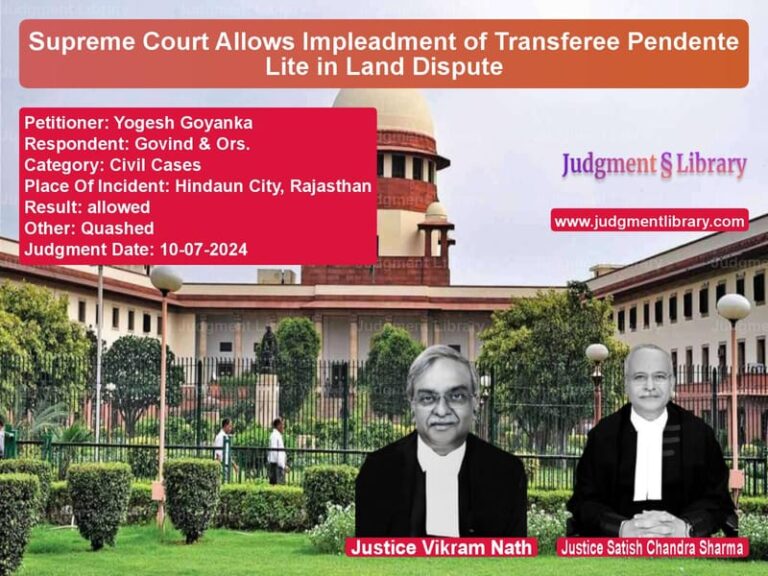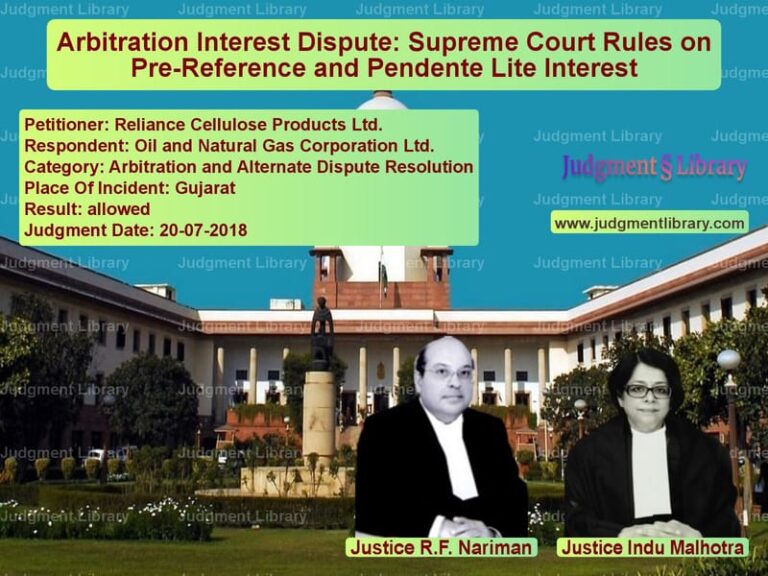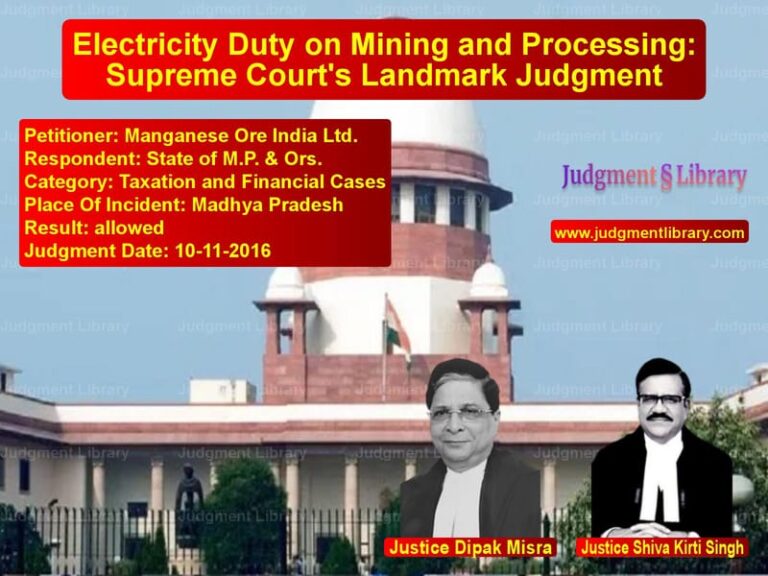Income Tax Search and Seizure: Supreme Court’s Verdict on Section 153C Compliance
The case involves a legal dispute regarding the assessment proceedings under Section 153C of the Income Tax Act, 1961. The Supreme Court had to determine whether the Assessing Officer had complied with the mandatory requirements before initiating assessment proceedings against the appellant, M/S Super Malls Private Limited.
The case arose from a search and seizure operation conducted under Section 132(1) of the Income Tax Act at the premises of individuals associated with the appellant company. During the search, certain documents and a pen drive containing details of cash transactions were seized. The Revenue authorities initiated proceedings under Section 153C, which led to additions being made in the assessment order.
Background of the Case
The appellant company contended that the assessment proceedings were invalid due to non-compliance with the statutory requirements of Section 153C. The Income Tax Appellate Tribunal (ITAT) ruled in favor of the appellant, stating that the satisfaction note recorded by the Assessing Officer was invalid. However, the Delhi High Court overturned the ITAT’s decision, holding that the Assessing Officer had followed the necessary legal procedures.
The appellant then approached the Supreme Court, challenging the High Court’s ruling and arguing that the assessment order was legally flawed.
Petitioner’s Arguments
The counsel for M/S Super Malls Private Limited raised the following arguments:
- “The Assessing Officer failed to record a proper satisfaction note as required under Section 153C before initiating proceedings against the appellant.”
- “As per the provisions of the Income Tax Act, the Assessing Officer of the searched party must first be satisfied that the seized documents belong to another person before transferring the case.”
- “In the present case, there was no independent satisfaction recorded by the Assessing Officer, making the entire assessment process invalid.”
- “The ITAT correctly held that the assessment order was vitiated due to procedural lapses.”
Respondent’s Arguments
The Principal Commissioner of Income Tax defended the assessment order with the following contentions:
- “The Assessing Officer’s satisfaction note clearly established that the seized documents pertained to the appellant.”
- “Since the Assessing Officer of the searched party and the appellant was the same, the requirement of independent satisfaction did not arise.”
- “The High Court correctly held that the assessment order was valid and in compliance with the provisions of Section 153C.”
Supreme Court’s Observations
The Supreme Court examined the requirements under Section 153C and the validity of the satisfaction note recorded by the Assessing Officer. The Court observed:
“Before issuing notice under Section 153C, the Assessing Officer must be satisfied that the seized documents belong to a person other than the searched party. This is a mandatory requirement that cannot be overlooked.”
The Court further held:
“In cases where the Assessing Officer of the searched party and the other party is the same, the requirement of transmitting documents does not arise. However, the Assessing Officer must still record satisfaction that the seized documents belong to the other person.”
Analysis of Section 153C
Section 153C lays down the conditions under which assessment proceedings can be initiated against a third party based on evidence recovered during a search. The Supreme Court examined the procedural safeguards under this section and emphasized that compliance with these safeguards is essential to uphold the validity of assessment orders.
The Court reaffirmed its earlier rulings in cases such as Pepsi Foods Pvt. Ltd. v. ACIT and Calcutta Knitwears, which held that satisfaction must be recorded by the Assessing Officer before proceeding against a third party.
Final Judgment
The Supreme Court upheld the decision of the High Court and dismissed the appeal filed by M/S Super Malls Private Limited. The Court ruled that the Assessing Officer had complied with the statutory requirements under Section 153C and that the assessment proceedings were valid.
The ruling clarifies the procedural requirements under the Income Tax Act for initiating assessment proceedings against third parties based on seized documents.
Key Takeaways from the Judgment
- Proper recording of satisfaction is mandatory before initiating proceedings under Section 153C.
- When the same Assessing Officer handles both the searched party and the third party, a single satisfaction note suffices.
- Failure to comply with procedural requirements can render assessment proceedings invalid.
- The judgment reinforces the principles of natural justice and due process in tax assessments.
Impact of the Judgment
This ruling has significant implications for tax authorities and corporate taxpayers. It sets a clear precedent that assessment orders must be backed by proper procedural compliance. The judgment also serves as a reminder to tax authorities to ensure that statutory safeguards are strictly followed to prevent unwarranted litigation.
Petitioner Name: M/S Super Malls Private Limited.Respondent Name: Principal Commissioner of Income Tax 8, New Delhi.Judgment By: Justice M.R. Shah, Justice Ashok Bhushan.Place Of Incident: New Delhi.Judgment Date: 05-03-2020.
Don’t miss out on the full details! Download the complete judgment in PDF format below and gain valuable insights instantly!
Download Judgment: MS Super Malls Priv vs Principal Commission Supreme Court of India Judgment Dated 05-03-2020.pdf
Direct Downlaod Judgment: Direct downlaod this Judgment
See all petitions in Income Tax Disputes
See all petitions in Tax Evasion Cases
See all petitions in Tax Refund Disputes
See all petitions in Judgment by Mukeshkumar Rasikbhai Shah
See all petitions in Judgment by Ashok Bhushan
See all petitions in dismissed
See all petitions in supreme court of India judgments March 2020
See all petitions in 2020 judgments
See all posts in Taxation and Financial Cases Category
See all allowed petitions in Taxation and Financial Cases Category
See all Dismissed petitions in Taxation and Financial Cases Category
See all partially allowed petitions in Taxation and Financial Cases Category







